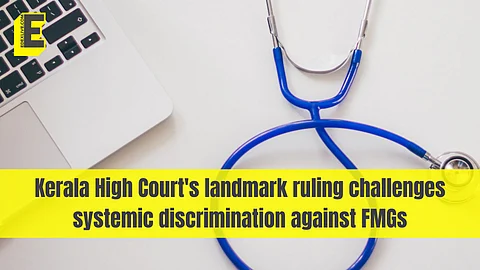

The Kerala High Court’s decision on June 3, 2025, to quash the state government’s controversial internship fee order marks a watershed moment in the fight against systemic discrimination faced by Foreign Medical Graduates (FMG) across India.
Justice N Nagaresh’s ruling in Sharooq Mohammed & Ors v State of Kerala has not only vindicated the rights of over 200 petitioning students but established a crucial legal precedent that could reshape how FMGs are treated nationwide.
The genesis of this landmark case traces back to April 2025, when the Kerala government issued an order, mandating that FMGs pay Rs 5,000 monthly for their Compulsory Rotating Medical Internship (CRMI) in hospitals.
This fee, totalling Rs 60,000 annually, was imposed despite a 2022 circular from the National Medical Commission (NMC), which stated that no fees should be charged for internships, though it left room for state specific administrative practices.
Dr Anagha PH, interning at Ernakulam General Hospital after completing her medical degree in China, recalls the moment. “We received the notice on April 19, asking us to start paying immediately. I knew this violated the NMC’s guidelines completely.”
Within days, she and 111 fellow interns filed a petition that would consolidate with similar challenges across Kerala, ultimately representing over 200 FMGs from diverse educational backgrounds spanning for Russia, Bulgaria, the Philippines, Guyana and China.
Despite their varied educational backgrounds, they shared a common experience of having cleared the notoriously difficult Foreign Medical Graduate Examination (FMGE), which carries a pass rate of merely 18-22 %. Having cleared this hurdle and obtained provisional registration, they argued for constitutional equality with IMG under Article 14 of the constitution.
Dr Jawhar Ali, also an FMG from China and interning at Government General Hospital Calicut, said, “People assume FMGs come from wealth, but that's not true. Many of us come from modest backgrounds, often on education loans.”
Kerala's legal defence rested on claims of administrative discretion and infrastructure support needs, arguing that NMC authority covered stipends rather than fees. However, this argument crumbled under judicial scrutiny.
The judgment was unequivocal in its condemnation of the practice. The court held that the fee order violated the supremacy of the NMC Act and constituted illegal discrimination against FMGs. The ruling reaffirmed that only the NMC has the authority to regulate internships and stipends.
The implications extend far beyond Kerala's borders.
Dr Kaushal, Media Coordinator of the All FMGs Association, emphasises the national significance: “This is a landmark ruling not just for Kerala but for FMGs across the country. With around 500-600 FMGs completing the FMGE every six months in Kerala alone, the financial burden affected 1,200-1,500 students annually.”
Discriminatory practices against FMGs exist nationwide. Himachal Pradesh charges between Rs 30,000 to Rs 1.9 lakh. Tamil Nadu once demanded up to Rs 5 lakh, later reduced to Rs 30,000. Karnataka and Maharashtra levy fees exceeding Rs 1.5 lakh under different administrative heads, creating a patchwork of exploitative practices across the country.
The discrimination extends beyond financial exploitation to procedural harassment. FMGs routinely face delays of months or even years between clearing the FMGE and beginning internships. In many cases, students are required to undergo extended internship periods of two to three years, based on assessments of their foreign clinical training.
Dr Anagha's experience illustrates this pattern. Despite clearing the FMGE in 2022, she only received provisional registration in 2023 and was mandated to complete two full years of internship because part of her training occurred online during the COVID pandemic.
The enforcement gap between NMC guidelines and ground reality represents a structural weakness in India's medical education administration. States consistently ignore or circumvent national directives, creating an environment where FMGs exist in perpetual uncertainty.
For the individual petitioners, the victory carries profound personal significance. For Dr Jawhar, it marks not an end, but a beginning, he now hopes to correct another long standing inequity by petitioning for parity in stipend payments for FMG interns, arguing that financial recognition must accompany legal equality.
“It's very disheartening when IMG receive stipends of around Rs 27,500 while FMGs doing the same duties receive nothing.” he says.
Looking forward, the Kerala precedent offers a template for similar challenges in other states, with parallel cases already emerging in states like Madhya Pradesh where students challenge extended internship requirements.
The challenge now lies in ensuring consistent implementation of this judicial precedent across all states. The NMC must strengthen its enforcement mechanisms to prevent future violations, while state medical councils require restructuring to eliminate administrative bias against FMGs.
For thousands of FMGs navigating India’s fragmented and hostile medical education system, the Kerala High Court’s judgment offers both vindication and cautious hope. By recognising FMGs as equals in law and practice, the Kerala judgment moves India closer to a merit-based medical system that serves both professional justice and public health imperatives
